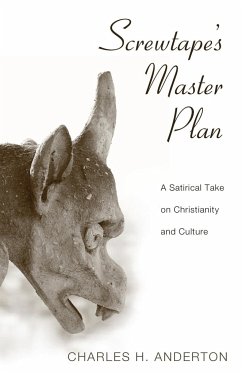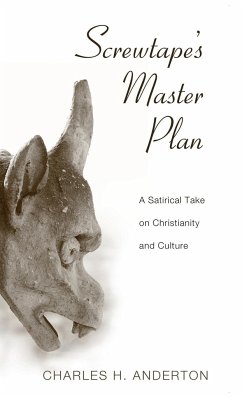
Screwtape's Master Plan
Versandkostenfrei!
Versandfertig in 1-2 Wochen
15,99 €
inkl. MwSt.
Weitere Ausgaben:

PAYBACK Punkte
8 °P sammeln!
He's baaack! That infernal demon, Screwtape, from C. S. Lewis's classic book, The Screwtape Letters, has returned. Screwtape is armed with a "Master Plan" designed to acidify and ultimately destroy the cultural tapestries of a critical region of the world and the humans therein. In a series of lectures delivered to a legion of demons, Screwtape highlights key principles and tactics for twisting human thinking and behavior in the areas of materialism, sexuality, intergroup relationships, self-actualization, work and vocation, and understandings of Jesus. Screwtape's ultimate objective is to snu...
He's baaack! That infernal demon, Screwtape, from C. S. Lewis's classic book, The Screwtape Letters, has returned. Screwtape is armed with a "Master Plan" designed to acidify and ultimately destroy the cultural tapestries of a critical region of the world and the humans therein. In a series of lectures delivered to a legion of demons, Screwtape highlights key principles and tactics for twisting human thinking and behavior in the areas of materialism, sexuality, intergroup relationships, self-actualization, work and vocation, and understandings of Jesus. Screwtape's ultimate objective is to snuff out God's light in the region by encouraging Christians to assimilate to prevailing cultural norms or withdraw into their own "cultural bubbles" rather than faithfully integrate into the cultures around them. Through a process known as the "Amishification of the Church," Screwtape expects the Christian church to become a minor backwater institution in the region by the end of the twenty-first century.














